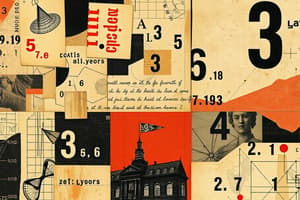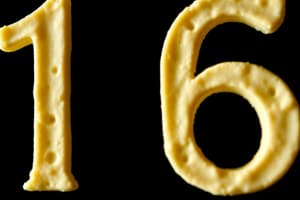Podcast
Questions and Answers
Natural numbers include negative integers.
Natural numbers include negative integers.
False (B)
Geometry studies the properties of shapes and sizes.
Geometry studies the properties of shapes and sizes.
True (A)
Complex numbers are represented in the form a + b, where a and b are integers.
Complex numbers are represented in the form a + b, where a and b are integers.
False (B)
Statistics involves analyzing and interpreting data.
Statistics involves analyzing and interpreting data.
In calculus, differentiation is related to finding accumulated quantities.
In calculus, differentiation is related to finding accumulated quantities.
Mathematical logic focuses on the validity of arguments.
Mathematical logic focuses on the validity of arguments.
Groups, rings, and fields are all types of mathematical functions.
Groups, rings, and fields are all types of mathematical functions.
Mathematics has applications only in science and engineering.
Mathematics has applications only in science and engineering.
Identifying the problem is the first step in the problem-solving process.
Identifying the problem is the first step in the problem-solving process.
Checking the results critically is an optional part of the problem-solving process.
Checking the results critically is an optional part of the problem-solving process.
Flashcards
Natural Numbers
Natural Numbers
Positive whole numbers (1, 2, 3, ...)
Irrational Numbers
Irrational Numbers
Numbers that cannot be expressed as a fraction of two integers.
Algebraic Equation
Algebraic Equation
A mathematical statement that shows two expressions are equal.
Calculus
Calculus
Signup and view all the flashcards
Statistics
Statistics
Signup and view all the flashcards
Mathematical Systems
Mathematical Systems
Signup and view all the flashcards
Mathematical Logic
Mathematical Logic
Signup and view all the flashcards
Applications of Math
Applications of Math
Signup and view all the flashcards
Problem Solving Steps
Problem Solving Steps
Signup and view all the flashcards
Mathematical Reasoning
Mathematical Reasoning
Signup and view all the flashcards
Study Notes
Fundamental Concepts
- Mathematics is a broad field encompassing various disciplines like arithmetic, algebra, geometry, calculus, and statistics.
- It is a systematic study of quantities, structures, space, and change.
- Mathematics utilizes abstract reasoning and logical deduction.
- Fundamental concepts include sets, numbers, operations, functions, and relationships.
Types of Numbers
- Natural Numbers (N): Positive integers (1, 2, 3,...).
- Whole Numbers (W): Non-negative integers (0, 1, 2,...).
- Integers (Z): Whole numbers and their opposites (-3, -2, -1, 0, 1, 2, 3...).
- Rational Numbers (Q): Numbers that can be expressed as a fraction p/q, where p and q are integers and q ≠ 0. Examples include 1/2, 3, -2/5.
- Irrational Numbers: Numbers that cannot be expressed as a fraction of two integers. Examples include π (pi) and √2.
- Real Numbers (R): The set of all rational and irrational numbers.
- Complex Numbers (C): Numbers of the form a + bi, where a and b are real numbers, and i is the imaginary unit (√-1).
Basic Arithmetic Operations
- Addition (+)
- Subtraction (-)
- Multiplication (× or *)
- Division (÷ or /)
- Exponentiation (power): A number raised to a power.
Algebra
- Algebra uses symbols to represent variables and numbers.
- It involves manipulating equations and inequalities.
- Key concepts include variables, expressions, equations, inequalities, and systems of equations.
Geometry
- Geometry studies shapes, sizes, positions, and properties of space.
- Fundamental shapes include lines, angles, triangles, quadrilaterals, circles, and 3-dimensional objects like cubes, spheres, and cones.
- Concepts like lengths, areas, volumes, and angles are essential in geometry.
- Geometric theorems and postulates provide foundational assumptions.
Calculus
- Calculus deals with change and motion.
- Differentiation (finding rates of change) and integration (finding accumulated quantities) are central to calculus.
- Calculus has applications in physics, engineering, economics, and other fields.
Statistics
- Statistics is the collection, analysis, interpretation, presentation, and organization of data.
- It involves using mathematical methods to draw conclusions from data.
- Key concepts include mean, median, mode, standard deviation, and probability.
Mathematical Systems
- Mathematical systems establish relationships between elements and rules that govern them.
- Various mathematical systems exist, like groups, rings, and fields.
- Each system has its unique characteristics and properties.
Mathematical Logic
- This branch of mathematics focuses on the validity of arguments.
- It explores concepts like proof, axioms, and theorems.
- The application of logic is critical in establishing mathematical truth.
Applications of Mathematics
- Mathematics has applications across many disciplines:
- Science: Physics, chemistry, biology
- Engineering: Civil, mechanical, electrical
- Computer Science: Algorithms, data structures
- Economics: Financial modeling, business analysis
- Social Sciences: Data analysis, research
Problem Solving
- Mathematics involves logical reasoning and structured problem-solving techniques.
- Strategies include identifying the problem, gathering information, forming a plan, executing it, and critically checking results.
Studying That Suits You
Use AI to generate personalized quizzes and flashcards to suit your learning preferences.




